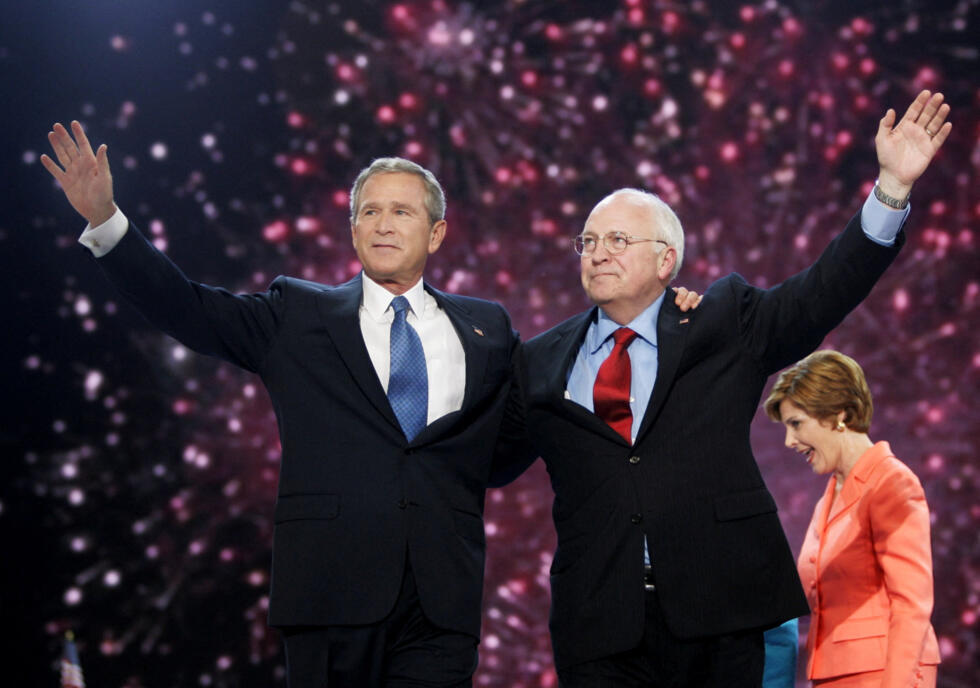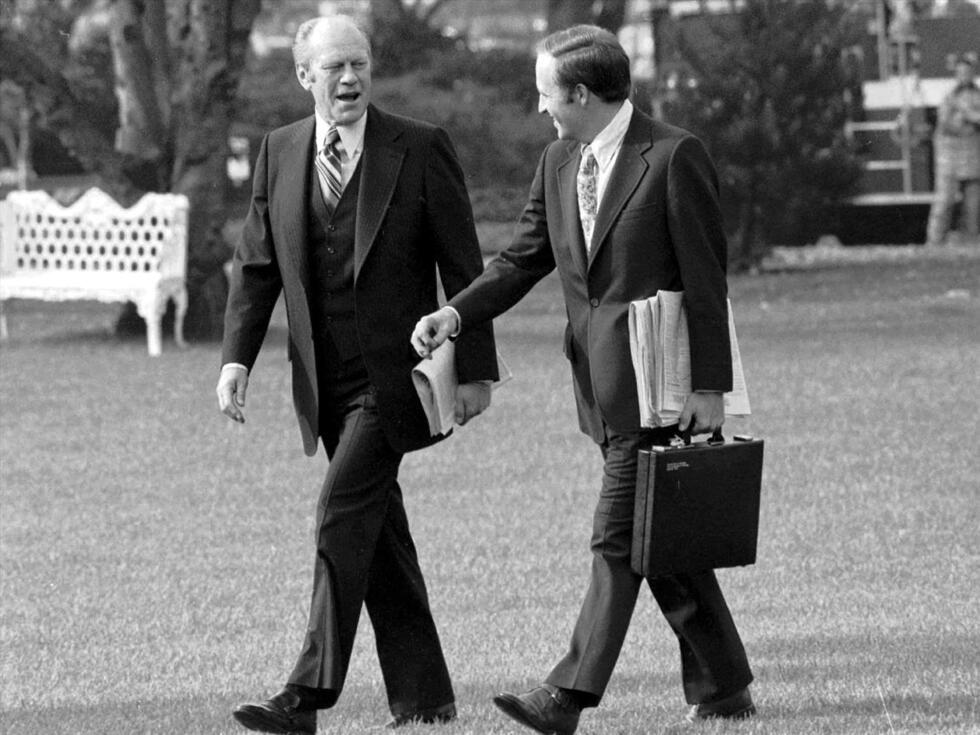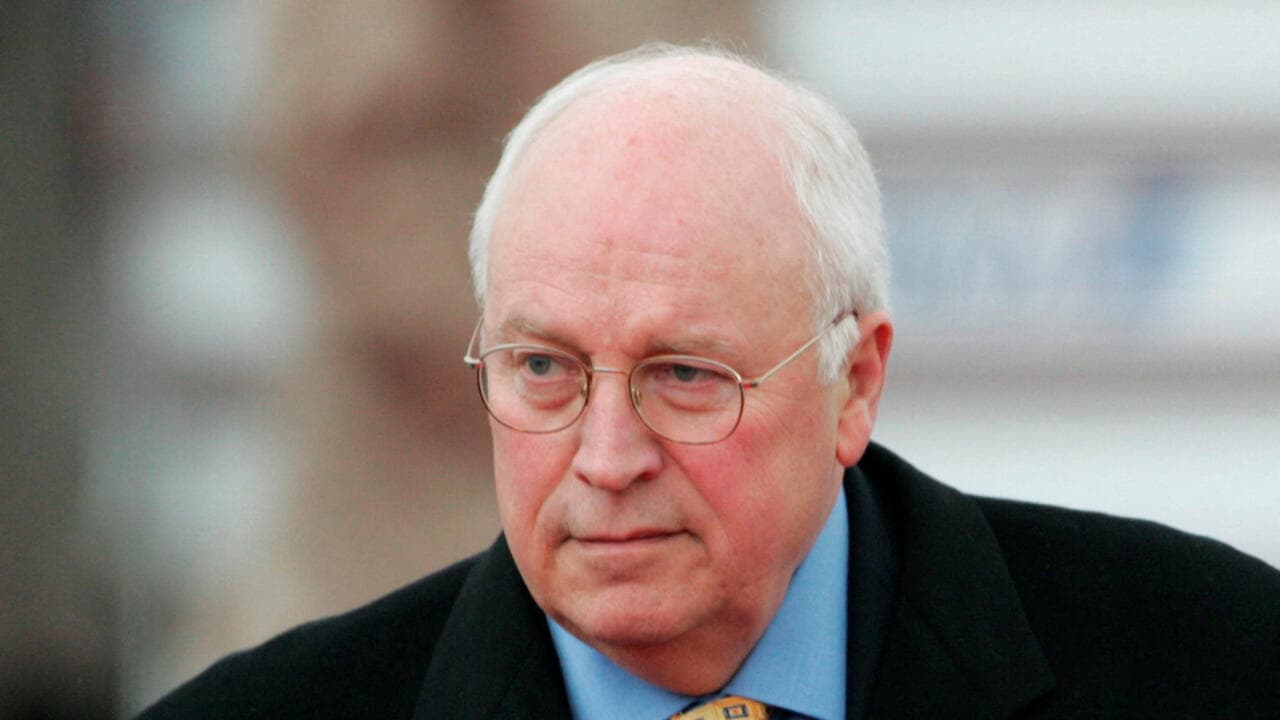Dick Cheney, the hard-charging conservative who became one of the most powerful and polarising vice presidents in US history and a leading advocate for the invasion of Iraq, has died at age 84.
Cheney died Monday night due to complications of pneumonia and cardiac and vascular disease, according to a statement from family spokesman Jeremy Adler.
The quietly forceful Cheney served father and son presidents, leading the armed forces as defence chief during the Persian Gulf War under president George H.W. Bush before returning to public life as vice president under Bush's son, George W. Bush.
Cheney was, in effect, the chief operating officer of the younger Bush's presidency. He had a hand, often a commanding one, in implementing decisions most important to the president and some of surpassing interest to himself – all while living with decades of heart disease and, post-administration, a heart transplant.
Cheney consistently defended the extraordinary tools of surveillance, detention and inquisition employed in response to the terrorist attacks of September 11, 2001.
Republican Trump critic
Years after leaving office, he became a target of President Donald Trump, especially after daughter Liz Cheney became the leading Republican critic and examiner of Trump's desperate attempts to stay in power after his election defeat and his actions in the January 6, 2021, riot at the Capitol.
“In our nation’s 246-year history, there has never been an individual who was a greater threat to our republic than Donald Trump,” Cheney said in a television ad for his daughter. “He tried to steal the last election using lies and violence to keep himself in power after the voters had rejected him. He is a coward.”
In a twist the Democrats of his era could never have imagined, Dick Cheney said last year he was voting for their candidate, Kamala Harris, for president against Trump.
The age of terrorism
As his vice presidency was defined by the age of terrorism, Cheney disclosed that he had had the wireless function of his defibrillator turned off years earlier out of fear terrorists would remotely send his heart a fatal shock.
In his time in office, no longer was the vice presidency merely a ceremonial afterthought. Instead, Cheney made it a network of back channels from which to influence policy on Iraq, terrorism, presidential powers, energy and other cornerstones of a conservative agenda.
When Bush began his presidential quest, he sought help from Cheney, a Washington insider who had retreated to the oil business. Cheney led the team to find a vice-presidential candidate.
Bush decided the best choice was the man picked to help with the choosing.
From the beginning, Cheney and Bush struck an odd bargain, unspoken but well understood. Shelving any ambitions he might have had to succeed Bush, Cheney was accorded power comparable in some ways to the presidency itself.
As Cheney put it:"I made the decision when I signed on with the president that the only agenda I would have would be his agenda, that I was not going to be like most vice presidents – and that was angling, trying to figure out how I was going to be elected president when his term was over with.”
His penchant for secrecy and backstage maneovring had a price. He came to be seen as a thin-skinned Machiavelli orchestrating a bungled response to criticism of the Iraq war.

A hard-liner on Iraq
On Capitol Hill, jokes abounded about how Cheney was the real No. 1 in town. Bush didn't seem to mind and cracked a few himself. But such comments became less apt later in Bush’s presidency as he clearly came into his own.
A hard-liner on Iraq who was increasingly isolated as other hawks left government, Cheney was frequently proved wrong about the conflict, without ever losing the conviction that he was essentially right.
He alleged links between the 2001 attacks against the United States and prewar Iraq that didn't exist. He said US troops would be welcomed as liberators; they weren't.
He declared the Iraqi insurgency in its last throes in May 2005, back when 1,661 US service members had been killed – not even half the toll by war’s end.
But well into Bush's second term, Cheney's clout waned, checked by courts or shifting political realities.
Courts ruled against efforts he championed to broaden presidential authority and accord special harsh treatment to suspected terrorists. His hawkish positions on Iran and North Korea were not fully embraced by Bush.
A further blow came when he shot a hunting companion in the torso, neck and face with an errant shotgun blast in 2006, he and his coterie were slow to disclose that extraordinary turn of events.
The vice president called it"one of the worst days of my life”. The victim, his friend Harry Whittington, recovered and quickly forgave him. Comedians were relentless about it for months. Whittington died in 2023.
Cheney retired to Jackson Hole, Wyoming, not far from where Liz Cheney a few years later bought a home, establishing residency in the state before she won his old House seat in 2016.
A Washington insider
Politics first lured Dick Cheney to Washington in 1968, when he was a congressional fellow. He became a protégé of Rep. Donald Rumsfeld, R-Ill,, serving under him in two agencies and in Gerald Ford’s White House before he was elevated to chief of staff, the youngest ever, at age 34.

Cheney held the post for 14 months, then returned to Casper, Wyoming, where he had been raised, and ran for the state's single congressional seat.
In that first race for the House, Cheney suffered a mild heart attack, prompting him to crack he was forming a group called"Cardiacs for Cheney". He still managed a decisive victory and went on to win five more terms.
In 1989, Cheney became defense secretary under the first president Bush and led the Pentagon during the 1990-91 Persian Gulf War that drove Iraq's troops from Kuwait. Between the two Bush administrations, Cheney led Dallas-based Halliburton Corp., a large engineering and construction company for the oil industry.
Cheney was born in Lincoln, Nebraska, son of a longtime Agriculture Department worker. Senior class president and football co-captain in Casper, he went to Yale on a full scholarship for a year but left with failing grades.
He moved back to Wyoming, eventually enrolled at the University of Wyoming and renewed a relationship with high school sweetheart Lynne Anne Vincent, marrying her in 1964. He is survived by his wife, by Liz and by a second daughter, Mary.

